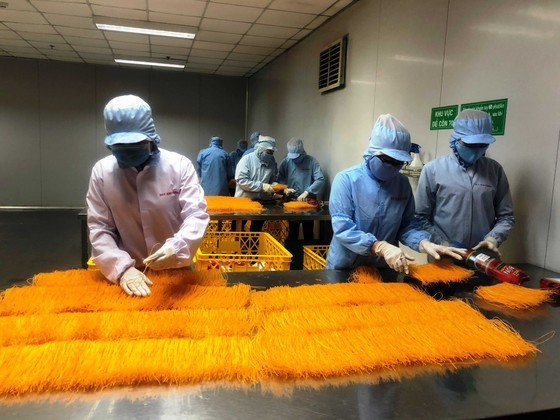23/02/2026, 02:00
Enterprises find more markets to adapt to new normal phase
Experts and businesses have discussed finding new markets for import and export to replace the Russian market in the conflict between Russia and Ukraine as well as issues related to trade risks and payment methods for partners in the two above-mentioned markets.
Employees of Duy Anh Import-Export Company in HCMC’s Cu Chi District process commodities for exports to Russia (Photo: SGGP)
Experts and businesses took part in yesterday’s seminar on ‘Adaptive solutions for import and export activities in the context of the Russia-Ukraine crisis’ organized by the Ho Chi Minh City International Integration Support Center (CIIS) in collaboration with the Vietnam International Arbitration Center (VIAC).
According to the General Statistics Office’s, in February 2022, Vietnam's goods exports to Russia reached more than US$180 million, down 44.46 percent compared to January while Vietnam's export revenues to Ukraine reached nearly $13 million, a month-on-month decrease of 60.3 percent.
In reality, many businesses are not directly affected by the Russia - Ukraine crisis, but they suffered huge indirect consequences that the conflict between these two countries, affecting their production activities, business, and consumption.
A leader of Phuc Sinh Group admitted that Russia is a large market and each year this enterprise exports more than $3 million of commodities including coffee, pepper, and cashew to Russia; nevertheless, Phuc Sinh Group is having to suspend exports to Russia due to the Russia-Ukraine conflict.
Mr. Truong Dinh Hoe, General Secretary of the Vietnam Association of Seafood Exporters and Producers, pointed out that the effects of the conflict include disruption and delay in payment, difficult transportation due to high freight charges delay in new contracts, disruption of seafood supply chain, increasing input costs for aquaculture and seafood processing activities.
He added that transportation was deadlocked, the partner proposed to move to another port such as Poland, Turkey, then they tried to bring it back to Russia, but it was very risky.
Consequently, to reduce risks, Mr. Truong Dinh Hoe gave some recommendations to businesses. For orders that have been delivered, it is necessary to implement quick payment measures through channels from foreign banks and private banks while for orders that are on the way or plan to be delivered, businesses should pull the goods back, postpone or cancel the order.
On the other hand, orders are still delivered according to customer requirements, but businesses should negotiate with partners about the payment stage, change the port, and additional costs. Above all, enterprises should simultaneously continuously update information from Russian and Ukrainian partners to promptly solve arising problems.
In addition, businesses also note solutions for indirect impacts, such as looking for opportunities to increase pangasius market share in European countries as well as develop trade promotion programs to expand exports to markets that previously consumed a lot of Russian seafood indirectly and take advantage of agreements in the Eurasian Economic Union and other agreements to increase exports to neighboring markets.
In Vietnam, international payment transactions are handled mainly via the Society for Worldwide Interbank Financial Telecommunication (abbreviated as SWIFT) and Western Union (WU) transfer channels. When using the SWIFT channel, customers will have to go to the bank branches of their choice to request to transfer money abroad. Banks will make money transfers through the SWIFT Code.
Western Union is an international fast money transfer service, headquartered in the US, operating in more than 200 countries and territories around the world. The information that Russia has been excluded from the SWIFT system as well as being embargoed by many countries has worried many businesses, typically businesses have to look for a series of alternative payment channels such as digital currency.
According to Dr. Le Hoang Anh who is working at the Banking University of Ho Chi Minh City, many Vietnamese export enterprises now choose to pay through an intermediary payment system in China, from which they pay their partners in Russia. In addition, businesses choose another channel which is payment via remittance. Most importantly, businesses have taken heed of secure payment methods in the current context.
However, discussing the safety of these new payment channels, Associate Professor Dr. Vo Tri Hao, Rector of Gia Dinh University and VIAC Arbitrator, said that usually in import-export contracts, the information of party A, party B, contact number, will include bank account number, SWIFT code and this information is agreed upon by both parties.
In case the two parties want to change, they must sign a written appendix, not unilaterally change, oral agreement, email or phone call is done. He advised not to transfer funds to a new channel without written confirmation or other safety measures, as it is most likely an account created by a scammer because several Vietnamese businesses have been deceived by this trick, with the loss of up to billions of Vietnam dong.
In addition, Associate Professor Dr. Vo Tri Hao also warned that Vietnam's law on foreign exchange payment is very strict. Therefore, businesses should transfer a new payment channel with caution because it will not be able to violate foreign exchange payment regulations, they may be under supervision, and be suspected of money laundering or terrorist financing.
In other countries when SWIFT is closed, they can choose to pay with digital currency, but in Vietnam, this payment is not accepted. At the same time, some payment channels from other countries should also be considered, because it is not excluded that users will be monitored and controlled, affecting economic and political security, said Mr. Vo Tri Hao emphasized.
RECOMMENDED TOPICS









